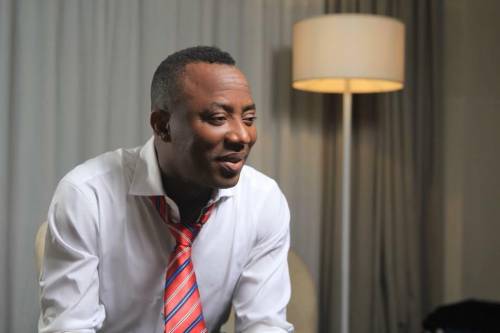
President Tinubu Stole My Idea On Foreign Exchange But Lacks Proper Direction — Sowore Says
Posted by Samuel on Fri 16th Jun, 2023 - tori.ng 
Mr Omoyele Sowore, the 2023 presidential candidate of the African Action Congress, has slammed President Bola Tinubu with an accusation.
He accused the President of stealing his idea on how to solve the problem of multiple exchange rate regimes in the country.
Tinubu recently suspended Mr Godwin Emefiele as the Central Bank Governor (CBN) and adopted a clean float foreign exchange management.
In a press statement signed by CBN director in charge of financial markets, Angela Sere-Ejembi, the apex bank announced immediate changes to operations in the Nigerian Foreign Exchange (FX) market.
The apex bank abolished its hitherto multiple exchange rate windows and collapsed them into the business-based Investors and Exporters (I&E) window.
Reacting to this, Sowore in a Twitter post on Friday, said that even though the idea of unifying the multiple exchange rates was stolen from his campaign promises, the manner by which it was implemented by Tinubu’s government was wrong and showed the tendency that it may not be sustained for a very long time.
“On the matter of the value of the Naira vs Dollar. 8 months ago I spoke extensively about the best ways to strengthen the local currency. Asiwaju Bola Ahmed Tinubu has “stolen” my ideas but the direction his govt has headed is incapable of long term economic growth. #Revolutionnow,” he tweeted.
While appearing on a live programme on Arise News TV months ago, Sowore explained comprehensively how his government would tackle the problem if elected as the country’s president.
Sowore said the first he would do is to suspend Emefiele because of his political affiliation.
He said: “The first thing we need to do is to completely erase the multiple rates system. That is what is promoting the corruption that is killing the Naira. If you go to the Central Bank of Nigeria today, depending on whom you talked to, depending on whom you know, you can exchange the Naira for as low as N300 to a dollar.
“I don't even know how many rates they have. Without eliminating that rate and allowing the Naira to find its own balance. Not by floating, but by ensuring that our microeconomic policies are in tandem with the managers of our economy.
“They all understand that the economy should be managed in certain ways. One thing that I would have done if I happen to be the president of Nigeria today is I would have fired the Central Bank Governor; he has no credibility, having dabbled into politics and tried to become a presidential candidate in the last primary.
“You cannot expect a microeconomic manager to be so tainted that people have no faith even in the central bank of the country. Ultimately, the way to protect the Naira is to produce. I have said this always that without production, without getting our system in place... To ensure that Nigerians, whether you are a small business person, or you are multinational cooperation, you can produce inside Nigeria, we will have no means of protecting our currency because we are not players in the international market.
“The only product we have there is oil, crude oil and about half of that is stolen on a daily basis. Today, we can't find those who are stealing 700,000 barrels of oil on a daily basis. But we can find people who steal phones and put them in jail forever.
“Leadership is key but most importantly to have a solid macroeconomic manager that understands that the Nigerian economy is not meant for ordinary investors. It is meant for the Nigerian people because I hear this all the time, people saying well we don't have a system that investors can come into.
“The problem is not foreign investors. It is our own people that must be protected first before we protect people who are here to come and invest in the short term and take away whatever big profit they can take.”
“It is a micro-economic issue and I think it is also a political economic issue. Because part of our problems, for the longest time, I know in 1989, our economy has been run by non-Nigerians, by International Monetary Funds and the World Bank. And they are not here to protect you. They are here to protect the interest of their government and their partners within multi-national cooperation,” Sowore added.



















































